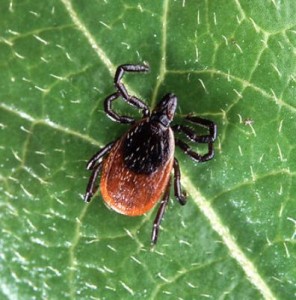A Word About Ticks
 Tick season is upon us. What you don’t know about ticks can hurt you and your pet. Ticks depend on animal hosts to feed and reproduce. In the process, they can spread serious diseases, such as Lyme Disease and Rocky Mountain Spotted Fever- diseases most of you have heard of, and which affect both dogs and people. Other serious diseases you may not have heard about include Ehrlichiosis and Anaplasmosis, which can affect your dog. Because of their complex life cycle, ticks and the diseases they carry cannot be eradicated, but only controlled.
Tick season is upon us. What you don’t know about ticks can hurt you and your pet. Ticks depend on animal hosts to feed and reproduce. In the process, they can spread serious diseases, such as Lyme Disease and Rocky Mountain Spotted Fever- diseases most of you have heard of, and which affect both dogs and people. Other serious diseases you may not have heard about include Ehrlichiosis and Anaplasmosis, which can affect your dog. Because of their complex life cycle, ticks and the diseases they carry cannot be eradicated, but only controlled.
The key to good tick control for your dog is using a good topical product that both repels and kills ticks before they can attach and transmit disease. Any dog that spends any time in the woods or in areas with overgrowth should be protected, at least during the spring and summer months. Since there is now evidence that some tick species remain active over the winter, year-round use is not a bad idea. Dogs that spend all of their outdoor time on grass, or indoor pets whose feet rarely touch the ground, probably don’t need to be protected.
The Center for Disease Control recommends that you reduce tick populations in your yard by following the guidelines below:
- Remove leaf litter.
- Clear tall grasses and brush around the homes and at the edge of lawns.
- Mow the lawn frequently.
- Stack wood neatly and in a dry area to discourage rodents.
- Keep playground equipment, decks and patios away from yard edges and trees.
- Discourage unwelcome animals (such as deer, raccoons, and stray dogs) from entering your yard by constructing fences.
- Remove old furniture, mattresses, or trash from the yard that may give ticks a place to hide.
We carry two products that provide excellent tick protection: Vectra 3D, a combined flea/tick product that is applied topically to dogs on a monthly basis; also, Simparica, a combined flea/tick product that is an oral chew tablet that last for 30 days.
And now a word about Lyme Disease. Until recently, this disease was only considered to be a risk in certain endemic areas of the country, including New England, the mid-Atlantic, and upper Midwest. That may be changing. Using our new 4DX heartworm test, which also screens for tick-borne diseases including Lyme, we recently detected our first home-grown case of Lyme Disease in a dog that had never traveled outside of Cincinnati. We will continue to monitor these events. We are told by the experts that it is only a matter of time before Cincinnati becomes endemic for Lyme Disease, just like other areas of the country. When that happens, we will recommend the inclusion of a Lyme vaccine into your dog’s core vaccine regimen.

